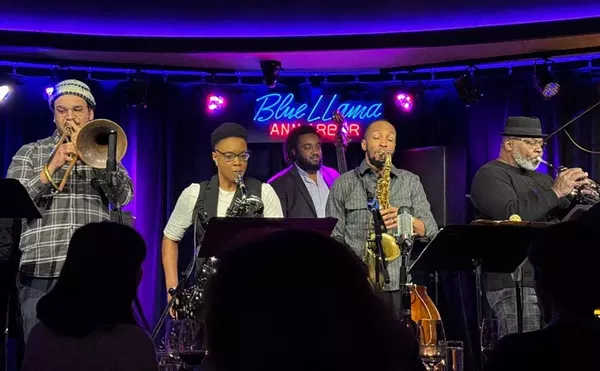For 15 years, the Concert of Colors has celebrated much of the musical diversity that the Detroit area can offer, and it has become a highlight of the city's summer schedule. In recent years, the climax of the event has been the Don Was Detroit All-Star Revue, which sees the Was (Not Was) man assemble a cast of local up-and-coming musicians, veterans, and everything in between, all of whom perform one song either as a combo or with the crack house band that Was pulled together.
This year's jam was, as ever, stunning. Andre Williams, Marshall Crenshaw, Alberta Adams and other notables wowed an ethnically diverse crowd, one that cared little for genre and more for quality tunes. The event is also an opportunity, however, for the lesser-known artists to generate new fans in a packed theater. This year, Jere Stormer did just that.
The folk singer and guitarist, who has been playing out for more than three decades, is not a spectacular sight. He ambles onto the stage with his guitar slung over his shoulder, an unassuming character with zero in the way of showbiz élan. But when he begins to play, he captivates: such is the raw honesty, emotion and wit in his voice and words. Like any great folk artist — be it Tim Hardin, Townes Van Zandt or Todd Snider — Stormer is a storyteller first and a singer second. Nobody could say his voice amazes, but then, of course, the same thing could be said of Dylan and Van Zandt. No, those who know of Stormer — and nowhere near enough do — listen to him to find out what he has to say. Yet, like any master folk artist, he's also a master of melody, able to craft a chorus that stays in your head like a cracked-out squatter in an empty Detroit house. "If You Lived Here, You'd be Homeless by Now," the song Stormer performed at Was' jam, is a great example.
While interviewing the guy, who's in his mid-50s, at the Ferndale home he shares with his wife, it's obvious how sharp he is — he darts from subject to subject with aplomb and ADD-ish regularity. His bookshelves are crammed with the great beats such as Kerouac and Ginsberg and also Hemingway, while his home studio is immaculately organized. This is Stormer's haven, his womb. The songwriter is a fascinating and likable guy, full of stories and yarns.
It was the influence of his family that jump-started his songwriting and singing.
"All my uncles had guitars slung all over their backs," he says, his tone not entirely devoid of nostalgia. "They were Missouri Southern guys. They would have played Southern rock if they were in my generation, but they were playing Ernest Tubb's country thing. My Uncle Moses [real name] had a touring Texas kinda swing band. He had a harmonica holder that was made out of a steer's horn. He would clamp that on and blow. That influenced me tremendously to pick up the guitar. I continuously begged my parents from the age of 7 to 13, and they finally relented. I got bloody fingers and I was off."
Stormer tried his hand at punk rock in the '70s, but, despite putting his best foot forward and professing respect for Patti Smith and the Ramones, found that punk's ragged nature wasn't for him.
"I got into singing and songwriting because I didn't have a nasty enough voice to sing over a band and I didn't have a sweet and high enough voice to sing over a band," Stormer says. "I could play guitar, but I couldn't express myself vocally, so I got people saying, 'You sound like Woody Guthrie. You sound like Bob Dylan,' and I thought, 'Hmm, maybe I should check those guys out.' I did, and I basically followed my voice into writing and singing, because it was the kind of music I could do. There's a lot of music I love, but with regards to my craft, it's kind of folky country stuff, despite loving to get out the guitar and blast once in a while."
Stormer, who describes his own sound as Appalachian and old-timey, talks of a healthy folk scene in metro Detroit, one you need to hunt for.
"The big problem is how spread out it is, and how hard it is to get together," Stormer says. "I'm in this songwriting group that meets in Livonia once a month. People come from Grand Rapids and Lansing and Flint and Ann Arbor, and I don't know how they do it. If we had a proper mass transit system in Detroit, a scene would spring up. It'd be self-evident, and that doesn't go just for folk, it would really help the alternative rock and other scenes. Scenes are intrinsically walking-distance things. If you can get to the subway in Jersey, you can go to Greenwich Village. In spite of that, scenes like the garage rock thing that bands like the White Stripes came out of, it still happens, but, man, it would be so extra-vibrant if we just had the ways to get around."
He is, of course, correct. Anyway, folk music has a grand tradition built on political awareness. Stormer admits that he is political, though reluctantly so.
"If I think back, I've always had a political bent, even in high school," he says. "I protested our nation's policy in Vietnam. I recognized that I wanted our country to be on the right side of this civil war, and I perceived that we weren't. That's what started my political awareness. It's not because I'm not grateful having grown up in America, but I'm invested in having my country on the right side of things. I grew up in Royal Oak and back in the early '90s, one guy went mad and killed a few people with gunfire at the Royal Oak Post Office. My response was to write a song about it. It's a ballad and it tells a story, but I was careful not to be preachy about it. It just talks about how abuse can come back and haunt you. I call it 'The Royal Oak PO.' It gets to people. I have a number of true-story songs like that."
Stormer, who has three albums under his belt, and is working on his fourth, admits that he'd like to have become better known at this point in his career, in an ideal world. He doesn't sit and sulk, though, and he recognizes, and is grateful for, the number of people who do enjoy his music, and that he has a body of work that he can look upon with pride. "Crafting the life I did by bouncing back and forth between bands and solo playing has been my biggest achievement," Stormer says. "Obviously, I'm not well-known. But that being said, I'm a journeyman musician who has that potential in terms of being a performer, I feel like I can pretty much do what I want to do. I've got the material that will serve me well and it's brought me to this point. I think my biggest achievement is being happy with that, and I reap the rewards every day. I see my influence on other people and I realize how I've been influenced. I genuinely love the musical community that I'm part of."
With Michelle Shocked at 8 p.m. on Friday, Sept. 24, at the Magic Bag, 22920 Woodward, Ferndale; 248-544-3030.






